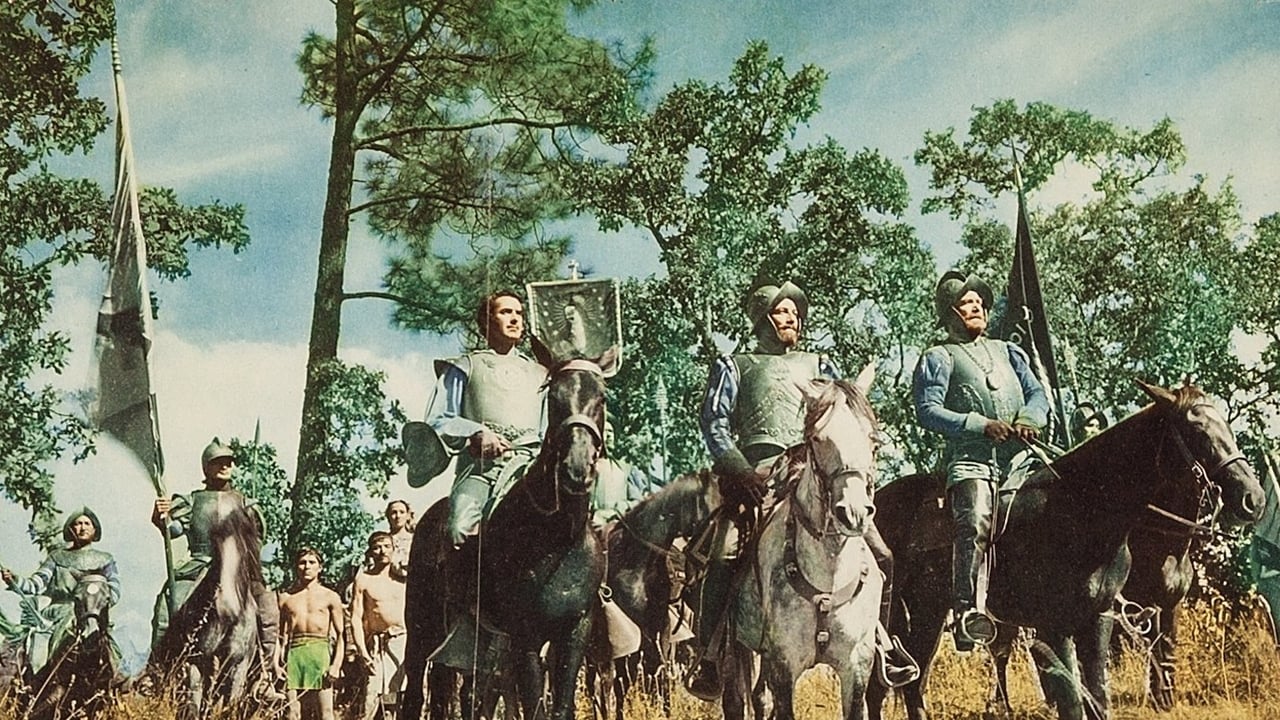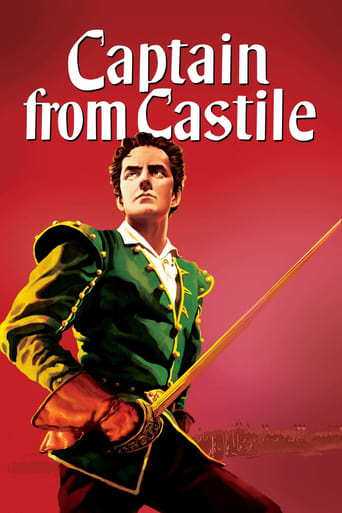

Very very predictable, including the post credit scene !!!
... View MoreThis movie is the proof that the world is becoming a sick and dumb place
... View MoreLoad of rubbish!!
... View MoreVery interesting film. Was caught on the premise when seeing the trailer but unsure as to what the outcome would be for the showing. As it turns out, it was a very good film.
... View MoreProducer: Lamar Trotti. The producers wish to acknowledge the advice and co-operation of the Mexican Government and the National Museum, Mexico. All scenes of the Cortez Expedition were photographed in Mexico, wherever possible on the actual locations.Copyright Twentieth Century-Fox Film Corp. 25 December 1947. U.S. release: 26 November 1947. New York release at the Rivoli: 25 December 1947. U.K. release: 26 September 1949. Australian release: 7 October 1948. U.S. release length: 12,707 feet. 141 minutes. Australian release length: 13,091 feet. 145½ minutes.SYNOPSIS: Effete young caballero escapes the Spanish Inquisition by joining up with Cortez and the conquest of Mexico.COMMENT: Dull. Bosley Crowther's review in "The New York Times" is pretty accurate. He doesn't go far enough in underrating Tyrone Power's pallid and insipid performance, yet falls short in valuing the magnificent color photography and impressive locations which alone make the film worth seeing.The rest of the players take their cue from Mr Power in listlessness, ineffectuality, amateurishness and apathy. Only George Zucco breaks the mold in his two brief scenes of resonant villainy. In fact, some of the players are even worse than Ty. Lee J. Cobb is absolutely ridiculous, and Alan Mowbray atrociously miscast. Jean Peters, in her film debut, gives absolutely no indications of either talent or personality, and is not even attractively photographed. Cesar Romero's genial Cortez is an odd characterization to say the least, while John Sutton's stiff, callow villain is no match for the likes of a Robert Douglas, a Claude Rains or a Basil Rathbone.But the film's greatest problem is actually its script: Wordy and garrulous in dialogue, superficially off-hand in background, casual in pace, one-dimensional and dull in characterization, repetitious and incredible in melodramatic plot.The worst sin of all is that the story lacks a climax. Not only is the villain disposed of quickly and undramatically by a minor player, but the battle we have been awaiting and anticipating for all of 140 minutes does not occur. The film ends as our heroes are marching off!Henry King's direction is equally tired and lifeless. But fortunately, Newman's score is rousing enough. And true, there is a bit of excitement and loads of production values in sets, costumes and extras milling around, but these full-blooded scenes are allowed to flash by too briefly in order to allow the film to linger on long, tedious scenes of boring verbosity or attenuated, unbelievable "romance".I have not read the book, but thought surely the novel was more exciting than this. I am glad to have Mr Crowther's verdict that it is. Rarely has such breathtaking Technicolor photography enhanced such an empty script!
... View MoreSpain in the spring of 1518 finds dashing nobleman Tyrone Power (as Pedro de Vargas) helping an acquaintance on horseback find a runaway servant. Locating the man, Mr. Power discovers he is slave friend Jay Silverheels (as Coatl), who shows his back has red welts from being whipped. Moreover, his wicked master John Sutton (as Diego de Silva) is in charge of the Spanish Inquisition. Power becomes "persona non grata" with Mr. Sutton, to put it mildly. What happens to Power's little sister is shocking for a mainstream film seen by general audiences, even though the deed occurs off-screen...Power's allies include pretty Jean Peters (as Catana Perez), enterprising Lee J. Cobb (as Juan Garcia) and colonizing Cesar Romero (as Hernan Cortes). The action eventually moves to Mexico. It's nice to see stereotyped thug Marc Lawrence (as Corio) doing a good deed. The film is lavishly presented in Technicolor by director Henry King with his cinematographers Charles G. Clarke and Arthur E. Arling. Alfred Newman's terrific musical score was nominated for an "Oscar" and Ms. Peters' busty debut received a "Newcomer" nomination in the annual "Film Daily" poll. However, the story is wearisome.****** Captain from Castile (12/25/47) Henry King ~ Tyrone Power, Jean Peters, Cesar Romero, Lee J. Cobb
... View MoreIt's a colorful pageant type film with some style and little substance. Not as classic in my opinion as the other Samuel Shellabarger book that was made into a Tyrone Power film, "Prince of Foxes". Both of these films were made by Henry King, a director who I find to be generally watchable but not particularly compelling. "Foxes" was done in color and the locations are a bit more impressive in my opinion, and perhaps just has a story and character that appeal to me more. In this film Power is playing a character with no real moral ambivalence, not even moments where the audience might make the mistake of thinking that he does. So he's kind of a dull character, but Power is a compelling enough actor to make it very watchable nonetheless.It's fun to see Cesar Romero as Cortez, riding around on impressive horses with shining armor and making big speeches. It's very odd to see Lee J. Cobb in tights, in his early scenes when he's befriending Power's character. But of course he's also such a good actor and knows how to use the screen so well that he's able to make a fairly standard character seem unpredictable. Jean Peters was solid in one of those roles where we're supposed to think that a really pretty girl is somehow practically un-noticed by most.I like the movie but I think that the script was probably dumbed down a bit compared to the book. You can't lose with Tyrone Power anchoring the entire film, but you wish that they could have made a slightly better picture to match his talents, coming right off his masterpiece in "Nightmare Alley" the same year.
... View MoreIf Captain from Castile is remembered much today it probably is because of one of the most rousing marches a Hollywood composer ever wrote. The "Conquest" theme is heard only three times, and the first two are brief but effective scene setters. We have to wait until the movie is almost over and Hernan Cortez is setting out on his march to the Aztec capital of Tenochititlan for the full treatment. The music, by Alfred Newman, embraces the moment, with hundreds of soldiers, the priests, the natives, the hangers-on spreading out before us, the horizon lightening and a single volcano smoking in the distance. The theme is inspiring, martial, emotional, uplifting and memorable. It's enough to make most movie goers want to sign up and most historians queasy. In less than a generation a civilization of between 2 million and 6 million people was obliterated, ground into quickly fading memories under the heels of soldiers, landowners and priests, with nearly all Aztec records burned, nearly all Aztec structures torn down, and nearly all natives, allies and enemies of the Spanish alike, turned into ignorant serfs under slave conditions that would make most American slave owners either blanche or be envious. But enough about reality, a foolish expectation when Hollywood deals with history. Captain from Castile is a Tyrone Power swashbuckler made under the shrewd eye of Darryl F. Zanuck. Considering that the book by Samuel Shellabarger was a huge best seller, well written and stuffed full of history, the movie seems to me to be almost as dull at times as a Spanish onion, especially during the first half hour. Here, in Spain, we learn about how noble is young Pedro de Varga (Power), how noble his father and mother are, how noble the serving wench Catana (Jean Peters) is, how noble Juan Garcia (Lee J. Cobb) is...and what a piece of self- serving vomit is the local head of the Inquisition, Diego de Silva (John Sutton). Once we're in the prison with Pedro, his family and Juan, where de Silva has put them for heresy, things pick up. After Pedro and Juan escape with Catana's help and when the three reach Cuba, things pick up even more. And after an hour, when we finally reach the coast of Mexico along with Cortez and his raggedy army of about 600 soldiers, the movie actually starts. Pedro may be fleeing the Inquisition, but now he has a chance to prove himself, to help Cortez conquer an empire, to realize his growing love for Catana even though he is of aristocratic birth and she is but a peasant, and finally to ride along side Cortez for the fateful meeting with Moctezuma II. His friend Juan is with him. His new wife Catana, carrying their baby son, is in the crowd, and he has his friend and confessor, the wise and understanding Father Bartolomeo (Thomas Gomez), to nag about human rights. Pedro has survived false accusations, sword thrusts and knife wounds. He has proved his worth to Cortez, has foiled plots and, finally, has been promoted in Cortez' army to captain. The captain from Castile is on his way to being a contented conquerer of the Aztecs. Two first-rate performances are worth mentioning. One is by Lee J. Cobb. After seeing Cobb so powerful in movies like Thieves' Highway, On the Waterfront and Twelve Angry Men, it's a jolt to see him in this earlier costume caper. Still, he manages to give a strong performance, in spite of the tights he has to wear. The other outstanding performance is by Cesar Romero as Cortez. Romero roars through the movie with charisma, high spirits and shrewdness. It's an expert job with no hamminess, and is one of the few performances in the movie that has energy. We pay attention whenever Romero shows up. Captain from Castile is a great example of a big Hollywood spectacle from the Forties, and I don't mean that as a criticism. On many levels it's fun to watch. At the same time, it seems to me to be a film which is too solemn for its own good. For those who enjoy a good historical read, Shellabarger's novel still has its merits. For an engrossing, exciting and often gruesome picaresque novel about the Aztecs just before, during and just after the Spanish conquest, try Gary Jenning's Aztec.
... View More